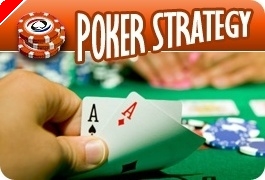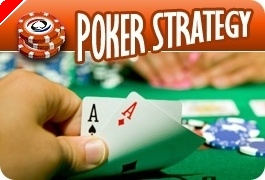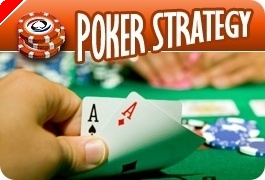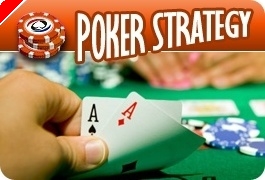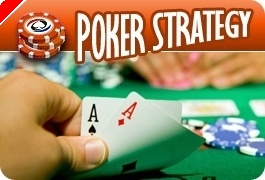Stud Poker Strategy: Reading Hands by Reading Cards

To be a successful stud player you must be able to use the information that is presented to you to figure out the likely hand of your opponent. Forget tells, important though they may be. Forget psychic ability, fantastic though that would be. I want to help you figure out your opponent's hand based on his betting action and the cards you see. If you can learn this lesson well, you'll be able to make more money by saving bets by folding when you are up against a better hand.
You must start with the premise that your opponent's actions are logical. True, they may not always be so. They may sometimes be illogical or deliberately deceptive. But you have to start somewhere in your analysis of the situation. So start with logic.
I was in a few hands recently that illustrated this concept well. Let me describe them for you, and see how you do.
It was fifth street. I had two hearts showing and a split pair of nines with an ace kicker in the hole. It looked like I might have a four-flush, but I really only had a three-flush and a pair of nines with the ace. My opponent was high with a king. He bet as he had from third street, either having or representing a pair of kings.
I made a move on him – one that I make from time to time, especially against a straightforward player – as this player was. He bet fifth and I raised. I figured there was a small chance he might throw his hand away, if he had been pushing a bluff into fifth street, for example. I figured that if he really had the pair of kings he'd just call and then check sixth street if he didn't improve, concerned that I might have hit trips on fifth street, with a wired pair. I could then check behind him or bet, depending on what I caught and whether I thought it was scary enough to win me the hand right there. Or, if I caught one of the other two nines or one of the other three aces, which were all live, I could value-bet or raise him if he bet. Either way, I figured a raise wasn't too far out of line.
So as I was saying, he bet. I raised. He just called.
On sixth street I caught a third exposed heart – for a four-flush. But I figured it might look like a flush to him since I raised on fifth. A lot of guys in this game raise on four-flushes with three of a suit exposed looking to get a free card on the next round. So maybe he'd think I just got lucky and caught my flush.
He caught an exposed pair, pairing his fifth street six for an exposed pair of sixes. I put him on kings up.
He checked, concerned, I figured, that I either had the flush or maybe that I had trips from the last round when I raised. I bet, hoping he'd fold now that I caught the third exposed heart. He called me. I figured then that I needed to catch a heart and make my flush, hit an ace for aces up, or hit a third nine to win the hand.
On the river I caught my flush. He was still high on board with his pair of sixes.
He looked at his final card and bet, saying, "I don't think you have that flush." And he pushed out $40 for the bet on the river.
What do you think he had?
Some players, making their flush in this spot, and hearing some smart remark from an otherwise straightforward player, raise. But I looked at his cards, thought about his betting action and reached a clear conclusion.
He had the full house. I knew he did.
So I folded my flush.
OK, I lied. I didn't fold my hand; I called him down. But I knew that he had the flush beaten. He had to have it beaten, as everything pointed in that direction.
I was right. He showed his hand: kings full. Made on the river.
It was obvious. I should have trusted my read and had the strength of my convictions (an article for another day).
How could I have been so certain?
Why else would he bet?
If he had two pair and didn't think I had the flush he would have checked and hoped that I bluffed again. He wouldn't have bet a hand that I had raised him on – not with just two pair.
And since the only way that he could improve was to catch a full house, I figured that's exactly what he had.
If he had two pair and thought I had the flush he'd be crazy to bet. No one folds a flush on the river after betting sixth street and raising on fifth street.
Even so, I have seen many players raise in my position. They draw for a flush, after representing it, and then they make it. So they feel compelled to raise when they make their 'good hand'. Their opponent bets the river in exactly the way that I describe, and they raise. What morons.
Well, not really. That's needlessly harsh. They just haven't thought things through logically. They think, if they think at all, "Hey, I made my hand. That guy bet. But I have a flush, which is a very strong hand, so I'll raise." Mistake.
Here's another example, from the same session. It happened on fifth street during the play of another hand the same day.
There were four of us in the hand going into fourth street, after three players called my raise on third street. I had an exposed ten and a wired pair of queens. They had, in turn, 7, K, 4. The bring-in folded.
On fourth street the 7 caught a suited jack, the king caught an off-suit 2 and the 4 caught a suited 3. I caught a jack, leaving these cards up on the table:
7-J (spades)
K-2
4-3 (hearts)
Me: (Q-Q) 10-J
I was feeling pretty good about my hand. I didn't like the two suited hands. Still, I figured to be in the lead. So I bet.
I got called by the suited 7-J. Again, I was feeling pretty good. Three of the folded cards were spades, including the king. Against that four-flush I was a favorite, thanks to the folded cards of his suit. And he might not even have a four-flush. He might have a pair of sevens or a wired pair or something heavily dominated by my pair of queens.
Plus, based on my raising with an exposed ten, if I hit a queen I'll probably be paid off.
And then fifth street. I got an unhelpful little card and he hit an off-suit ace.
He checked. I bet $40 in this $20/40 game. He raised me to $80. He check-raised me!
I folded.
Think about it. My fold is fairly straightforward. (And this time I really did fold.)
When he hit the ace and then check-raised me, what else could he have but aces up? With aces up he is a huge favorite, about eight-to-one, over my queens. I had to put him on aces up. Why else would he check-raise here? Sure, there's always the chance that he's just mixing up his play or that he's acting with irrational exuberance. But it wasn't worth the additional $120 it would take to find out (the $40 raise on fifth, the bet on sixth and the bet on the river).
It's critical to think about not just how your hand is developing but how your opponent's hand is developing (and sometimes how he must be thinking your hand is developing as well – but that's yet again an article for another day). This two-dimensional thinking is necessary for you to maximize your profit, since only by figuring out your opponent's likely hand can you save money on good hands of yours that are likely to be second best. By looking at their actions and thinking, you should be able to figure out what they have in many situations.
And then, of course, you need to respond correctly.


